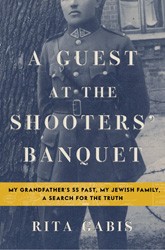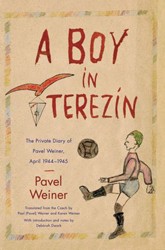May 13, 2013
This is the story of Rosie, a Dutch dance instructor who charmed her way through Auschwitz by teaching lessons to the SS. Her epic life becomes a window into the author’s own past, and the key to discovering his Jewish roots. Raised Roman Catholic, Paul Glaser was shocked to learn of his father’s Jewish heritage. Grappling with his newfound identity, Paul set out to discover what happened to his family and his estranged aunt Rosie during World War II. An emancipated Dutch woman who defied convention, Rosie Glaser toured Western Europe teaching ballroom dancing to high acclaim. When the Nazis seized power, Rosie, a non-practicing Jew was betrayed by both her ex-husband and her lover and sent to a series of concentration camps. She survived, in part by teaching dance and etiquette lessons to her captors. Rosie’s spirit and incredible resourcefulness kept her alive amid tragedy. Of the 1,200 people who arrived with her at Auschwitz, eight survived. Dancing with the Enemy recalls an extraordinary life marked by love, betrayal, and fierce determination.
The book contains authentic songs and letters Rosie wrote in the concentration camps, as well as photographs that were buried underground.
Discussion Questions
JBC Book Clubs Questions
- In the book, it says that Rosie never lost her joie de vivre, which is reflected in the unusual matter-of-factness and optimism of Rosie’s narrative. Paul notes that her letters from the camps have no trace of self-pity and that she constantly tried to take control of her life and to enjoy what she could (p 161). How did this affect your reading of her account?
- Rosie wonders if her attempts to comfort people going into the gas chambers were acts of betrayal or kindness. What is your interpretation?
- What do you think of Rosie’s “dancing with the enemy” (both literally and figuratively)?
- After the war, Rosie wonders about “good” people and “bad”– the “bad” Germans (Jorg, Kurt, Magda, the doctor) who were kind to her vs. the “good” Dutch who betrayed her, arrested her, made reparations difficult after the war. She writes, “There was no black and white. There were only people. Some were kind; others were not. The vast majority were honest, naive, obedient, and opportunistic.” (p. 239). What do you think of her attitude?
- Paul is struck by the amount of security at his cousin’s synagogue (p. 187), and disturbed by his increasing understanding of the behavior of the Dutch authorities and citizens during the war. He also faces concern from his siblings about revealing the family’s secret heritage. Does this impact your opinion of Paul’s father’s decision to keep his Jewishness a secret?
- How does Rosie’s outlook change from before and after the war?
- Did you find Rosie to be relatable? Which of her traits did you find most admirable? Her defiance, her optimism, her love of fun, her ability to survive, her straightforwardness?
- What do you think of Paul’s decision to write this story, despite people in his family wishing to remain silent?
JBC Book Clubs questions © Jewish Book Council, Inc., 2014




